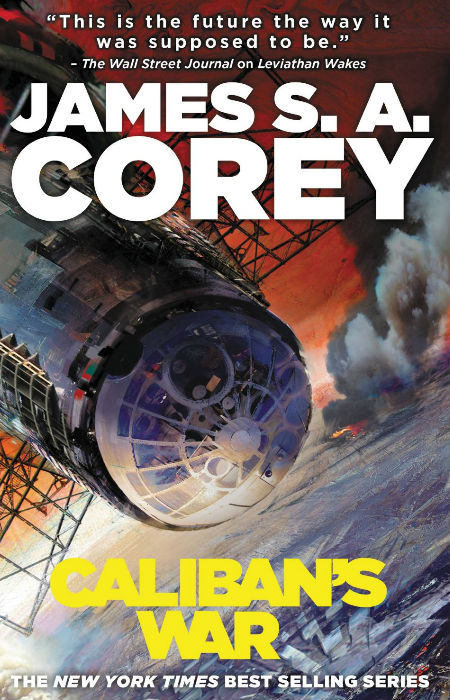
There’s an admirable Utopian tendency among some science fiction to advance the idea that once humanity takes to the stars that all its problems will be solved, that we will join together in a spirit of selfless sacrifice and devotion to noble ideals, not only among ourselves but with many of the alien species we encounter.
It’s an appealing idea, the idea that the future holds not just technological advances but the entire betterment of humanity.
Alas, if history is any guide, and it is usually instructively accurate, while we may wish for the better angels of our nature to take ascendancy, the reality is that the faults and foibles of people down through the ages will continue to play out as always, whether they’re on Earth or one of the planets of our solar system and beyond.
That’s not to say there won’t be progress but humanity’s basic propensity to squabble and fight over pretty much everything will remain undiminished; it’s this central idea that forms the core of The Expanse series from James S. A. Corey, the nom de plume of two collaborators Daniel Abraham and Ty Franck.
In the sprawling world they have created, humanity has taken to the stars with gusto, terraforming Mars which is now home to 4 billion people and a fearsome military power in its own right, and staking claims on Uranus, Neptune, Jupiter and Saturns and all their attendant moons.
It is on one these moons, Ganymede, the biggest moon orbiting Jupiter, and the breadbasket of the Outer Planets which are engaged in an increasingly fractious and oft-violent battle for independence from Earth, that the second instalment in the series, Caliban’s War (named after one of the main antagonists in Shakespeare’s The Tempest), that follows Leviathan Wakes, begins its breakneck ride.
Attacked by an altogether new human hybrid form of the aggressive, mutative alien lifeform known as the protomolecule – sent eons ago by an unknown alien race, this militant black sinuous life was supposed to seed Earth with extraterrestrial biology, a plan which foundered when its vehicle got caught in Saturn’s pull – Ganymede is a casualty of a dangerous arms race between Earth and Mars particularly, with the Outer Planets Alliance (OPA) watching on and taking advantage where it can.
Into this brewing mix of intrasolar rivalry comes William Holden and the crew of the Rocinante – Naomi, Amos and Axel – who are once again caught up in the violent machinations of humanity’s drive to compete and grab all the spoils, a tendency that expansion into the stars hasn’t diminished one iota.

And so unspools, with ever-escalating fury and tension, another gripping tale of battles for power, influence and sheer survival, all underpinned by shady backroom machinations and underhanded dealings that reek to high heaven no matter where in the galaxy they are taking place.
Once again James S. A. Corey spins a deliciously dense and appropriately expansive narrative that is bigger than a galactic Ben Hur but which retains an engrossing sense of intimacy and emotional impact by dint of focusing on the many people affected by these realpolitik plays.
People like Praxidike Meng, a botanist on Ganymede, who finds his world turned upside down when his home is destroyed and his daughter is kidnapped by nefarious people unknown; by focusing on Meng’s struggle to find his daughter, with the help of Holden and crew, in as fine form as always, and a number of surprising other players, Caliban’s War, though epic in intent and execution, retains an intimate and deeply appealing sense of emotional authenticity.
This is how all good cinematic soap opera should be written.
Large, immense and compelling, with stakes so high that the fate of humanity literally hangs in a black goo balance, Caliban’s War succeeds in setting a stupendously large stage for events to follow while remaining a gripping story in its own right.
It does this by remembering that while humanity now comes equipped with solar system-crossing starships and the ability to change and transform worlds at will, it is still very much a creature of its failings, and no amount of Epstein Drives (think a warp drive) and colonies on distant solar moons can change that.
It’s not a hopeless cause, and the good guys stand a pretty good chance of winning all things considered but at the heart of it is humanity’s long-lasting ability to undo itself in spectacular fashion just when the world is at its fingertips.
It also highlights the inability of people to draw together in any kind of cohesive, unified way even in the face of grave threats from terrifyingly powerful alien lifeforms who aren’t encumbered by morality or amorality, or any kind of emotional drag.
In many ways that’s a good thing for storytelling as fine as this, which reads like an epic sci-fi blockbuster, pushing us along at breakneck speed, but which never forgets that at the heart of all good stories are the small, intimate tales of people simply trying to fashion a meaningful life for themselves.
It’s impressive in every way and marks The Expanse, which has just released the sixth volume in its series, Babylon’s Ashes, and is not heading towards a second series on syfy, as a stellar sci-fi series that understands that no matter how glorious the future may be, that humanity won’t necessarily rise to meet the challenge.
Which for anyone who values incredibly well-written gripping power plays across an impossibly big galactic background, perfectly counterbalanced by small intimate stories of innate humanity, is a very good thing indeed.